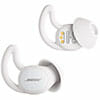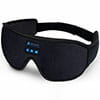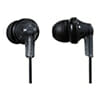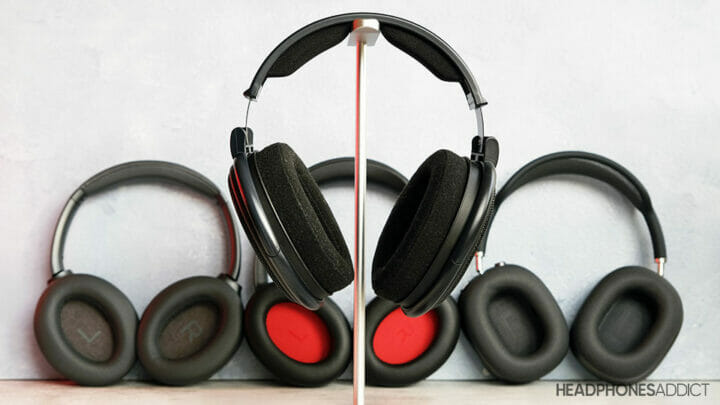The best headphones for a healthy night of sleep.
| Rating | Price | Connection | Battery life | Washable | Noise cancelling | More info | |
|---|---|---|---|---|---|---|---|
|
4.2
|
Under $250
|
Bluetooth 5.0
|
10h + 30h in case
|
|
|
||
|
4.3
|
Under $20
|
Wired – 3.5mm
|
/
|
|
|
||
|
4.3
|
Under $20
|
Wired – 3.5mm
|
/
|
|
|
||
|
4.1
|
Under $150
|
Bluetooth 5.0
|
12h + 56h in case
|
|
|
||
|
3.9
|
Under $40
|
Wired – 3.5mm
|
/
|
|
|
||
|
4.0
|
Under $20
|
Wired – 3.5mm
|
/
|
|
|
||
|
4.4
|
Under $30
|
Bluetooth 5.0
|
10h
|
|
|
||
|
4.3
|
Under $80
|
Wired – 3.5mm
|
/
|
|
|
||
|
4.3
|
Under $10
|
Wired – 3.5mm
|
/
|
|
|
||
|
4.0
|
Under $250
|
/
|
28h
|
|
|
People have different needs. Some of you can fall asleep instantaneously and stay asleep no matter what, whereas the other group struggles to close their eyes. You can achieve that much easier if you’re sleeping in environmental noise-free place. However, sometimes you simply can’t escape disruptive noises.
You’ve probably been in a situation when one person next to you snores, or you probably have noisy neighbors next door. While most people do that quietly, some have a thunderous snoring partner, which can keep you up throughout the full night.
To break the endless cycle of unslept nights counting sheep, you can choose to get the best headphones for sleeping.
These sleep headphones primarily help block out unwanted noise that prevents you from clearing your thoughts and falling asleep.
They do that by either playing white noise (white noise machines exist), relaxing sounds of nature, or using active noise canceling to eliminate the noise entirely.
They usually can’t play music, although that isn’t the rule, as you can see in our guide. People have different needs, and maybe you prefer to travel into a land of dreams by listening to music, a podcast, or an ASMR recording.
- Before we go into details, here’s how to sleep comfortably with headphones.
What Types of Headphones are The Best for Sleeping?
While most earbuds and headphones have a bulky construction, some are small enough to fit comfortably even when you take them to bed. As long as they don’t hit the pillow or create too much pressure on your ear lobes, they’re perfectly fine to use during sleep.
However, it does depend on the overall design of which ones are more practical. The latter when choosing headphones is more important to those who are side sleepers.
Over-ear headphones
As mentioned, full-sized headphones can be incredibly bulky. And despite their overall comfort, they can be a terrible pick to bring in bed. However, if you’re one of the back sleepers (you move very little during sleep), they might work.
As long as you find the right set that don’t hit the pillow, it should be fine. With over-ear pair, you can achieve the best sound quality if you plan to listen to music and let that calmly drift you into slumber.
Also, bigger wireless headphones usually have the best noise cancellation. However, not many people go to sleep and wake up in the same sleep position. Therefore, it’s very likely big headphones will come off your head during sleep and wake you up.
On-ear headphones
Like over-ears, these too bring a fuller sound and better isolation but can become uncomfortable if you move too much.
Some other types of on-ears come with ear hooks. That kind of ear hook design eliminates the headband frame’s pressure and makes the experience more comfortable, although still not great if you’re a side sleeper.
In-ear headphones
One of the better options you like to have some level of maneuverability. Of course, the best option is wireless since you don’t have to worry about waking up with a tangled wire.
The best noise-cancelling headphones are usually quite effective with eliminating low-frequency noise and should easily block partner snoring. You can also rely solely on passive isolation, which is above average on in-ears.
However, the main problem still stands. You probably have to buy earbuds specifically made for sleeping if you want the best comfort.
Many in-ears, especially wireless, tend to stick out a lot, which isn’t ideal for side sleeping.
Headband Headphones and Eye Masks
By far, the best sleep products and a popular solution for those seeking ultimate comfort during deep sleep. Many people prefer to sleep in complete darkness due to light pollution or because it bothers them.
It’s actually healthier for our body to sleep in a pitch-black room, so choosing a face mask has many advantages.
Manufacturers combined the face mask and tiny headphone speakers to make the best sleep headphones that don’t irritate when in bed. The same thing applies to the headband style, only that they don’t cover the eyes.
These sleep headphones are entirely washable since they’re made from fabric that can eventually get dirty. Of course, you need first to take out the speakers.
The biggest problem with that headband headphones is the overall audio quality, which is about on-par with the best cheap earbuds. It can also be challenging to wear them during the summer when you already feel too hot.
More similar guides:
Best noise isolating headphones
Best noise cancelling headphones
10 Best Headphones for Sleeping
1. Bose Sleepbuds II

The latest sleeping true wireless earbuds from Bose with many positive customer reviews. They offer 40 different masking sounds to help you fall asleep.
- Small and lightweight design
- Companion app with 40 noise-masking sounds
- Great stability during sleep with ear fins
- No active noise cancellation
- No option for music playback
Proprietary StayHear silicone ear gels help them stay in their place, regardless of how often you change your sleeping position.
Instead of implementing active noise cancellation, Bose decided to rather opt for outside noise-masking technology.
Inside the Bose sleep app, you can toggle between 40 different sleep sounds of water, nature scenes, and other relaxing tunes.
You can also set an alarm clock to wake you up in the morning calmly. Despite their size, Sleepbuds II can last up to 10 hours on a full charge, with another 30 hours in the charging case.
It’s worth mentioning that Bose Sleepbuds II don’t support your own music playback, despite supporting wireless Bluetooth technology.
That means you can’t listen to music during the day and sleep with them during the good night’s rest.
2. MAXROCK EL-2737 Unique
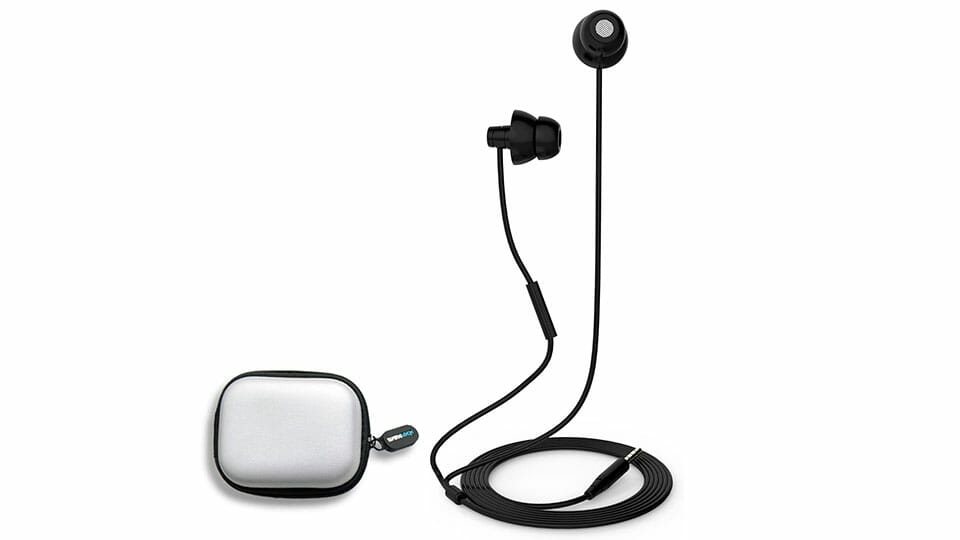
By far, the best headphones for sleeping (wired) with excellent background noise isolation and flush fit.
- Good stability
- Small, comfortable size
- Wired headphones aren't practical for sleeping
Small 5mm drivers can produce a reasonably balanced sound without exaggerating any frequency. They’re clean throughout the midrange and treble but lack a little bit of bass.
You can still use them to commute or work out, although they don’t offer any liquid protection.
Wired in-ear headphones from MAXROCK are quite durable and come with a carry case, despite their budget-friendly headphones price point.
The housing is made from plastic and comes with double-flanged ear tips.
The latter go deeper into the ear canal, ensuring above-average passive isolation, which is vital for blocking unwanted external noise.
Unique budget pair of earbuds for sleeping come with a 3.5mm jack and an inline remote for skipping and pausing tracks, and answering phone calls from your audio device of choice.
3. Panasonic RP-HS46E-K
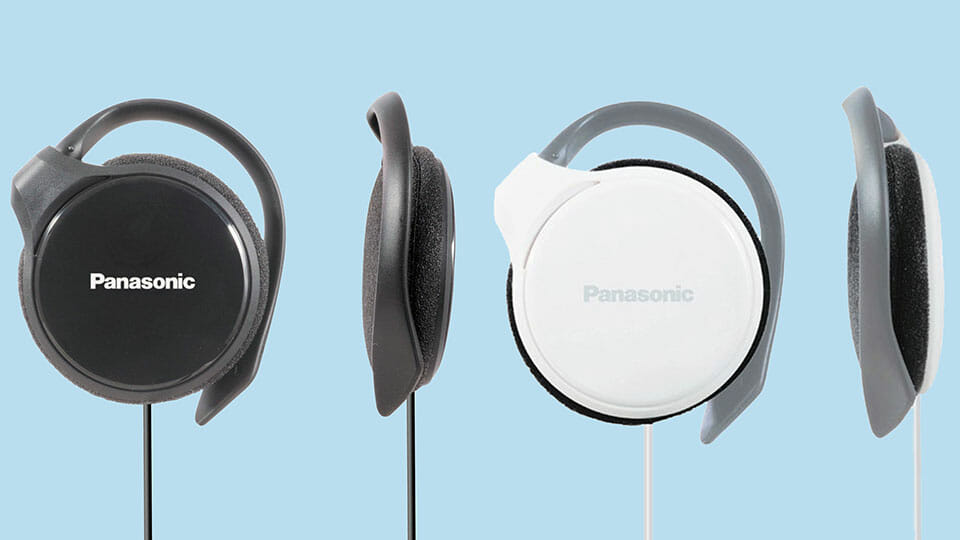
If you don’t twist too much during the good night’s sleep, these on-ear traditional headphones might be an excellent pick.
- Slim, lightweight, and ergonomic design
- Ear hooks ensure stability
- Cable noise
Thanks to the 30mm drivers, the clarity is excellent and with decent bass.
The rest of the spectrum remains very clear, regardless of what you’re playing. Because they rest gently on your ears, the sound is also quite airy and spacious. Of course, there’s some sound leakage that could bother your partner.
These unique-looking headphones with a thin profile come in different color options and don’t have a headband to stick to your head.
Instead, they come with ear hooks that only grab your ear lobes. Thankfully, that kind of approach is quite comfortable, with nicely padded earcups.
These are considered one of the most comfortable headphones for sleeping with an on-ear design because of the slim design.
Especially since the back of the earcup doesn’t hit the pillow when you lay down.
4. Amazfit ZenBuds
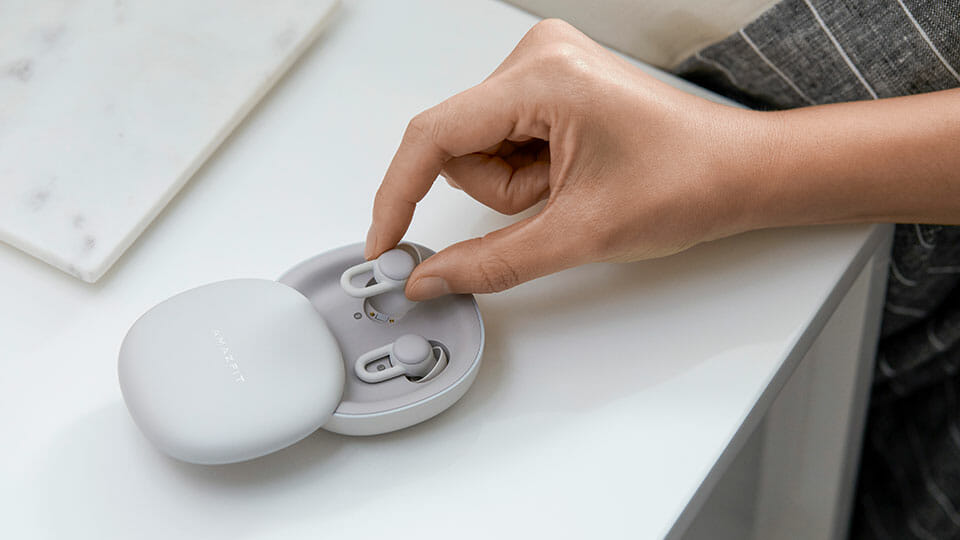
ZenBuds are a more affordable alternative to Sleepbuds II sleep headphones, with a similar Bluetooth connection and important features for sleeping.
- Excellent battery life
- Great comfort and stability
- Useful features (auto-pause, heart rate and sleep monitoring)
- Don't support music playback
While these sleep headphones play sound on demand, they only play pre-recorded tracks from a companion app. They consist of soothing sounds of nature and other sounds engineered to help you relax and fall asleep easier.
A special sleep detector can automatically pause the playback after traveling into the dreamland.
Inside the app, you can create a personal alarm to only wake up you and not others around you.
It can also alert you for notifications and track your sleeping pattern. They have a heart rate monitor and can detect sleep positions to show you your sleep quality.
Earbuds with ear fins sit flush so that you don’t feel them in your ears, even if you’re among side sleepers. ZenBuds last around 12 hours on a single charge.
5. AcousticSheep SleepPhones Classic
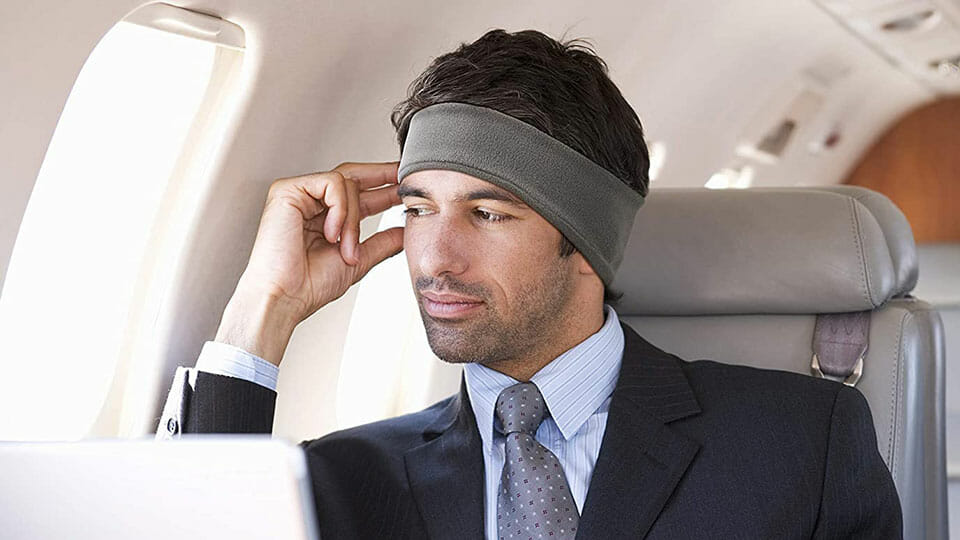
A headband design of flat headphones that is comfortable to wear and can keep your ears warm.
- Comfortable, simple design
- Washable fabric
- Below-average sound and build quality
- No controls
Of course, you can’t expect impressive sound quality out of a headband headphone type. Its audio performance is decent for listening to audiobooks and relaxing music.
The headband is made out of a breathable, hypoallergenic mesh lining that feels nicely soft and doesn’t get uncomfortable during sleep or long flights. There are fabric options in other colors, too.
Speakers inside are well-padded, which is why it doesn’t irritate your ears, even if you’re side sleeping.
For speakers to work, you need to plug them via a 3.5mm audio jack. You can wire the cable in whatever direction you want to prevent tangling.
The cable is long enough to keep your phone away from you. You can machine wash the headband to keep it fresh.
6. CozyPhones Sleep Headphones
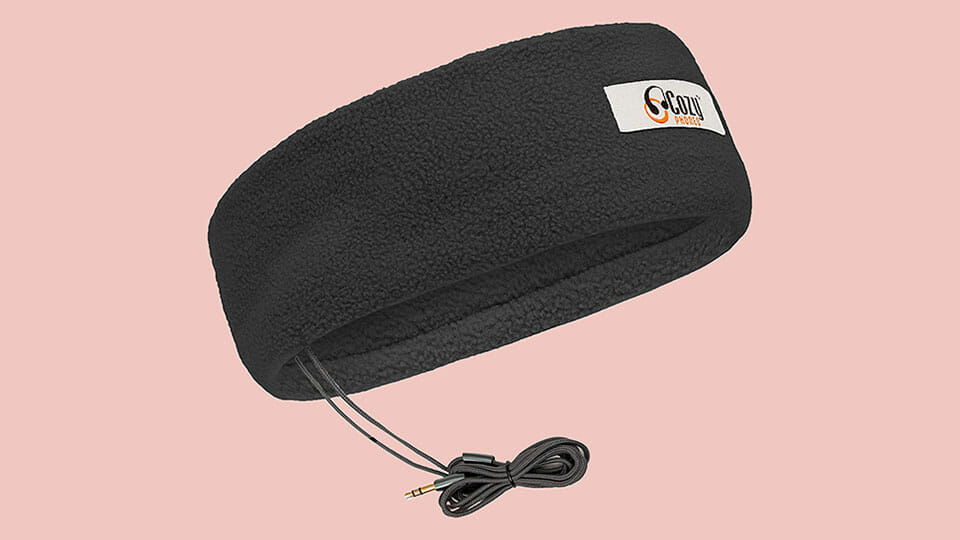
Another excellent budget option for headband sleep headphones lovers who want to cover their ears but not their eyes.
- Durable braided cable
- Washable fabric
- Decent sound
- … that doesn't get very loud
You can’t expect sonic fidelity out of these sleep headphones. Flat speakers do a reasonable job of listening to things like audiobooks and podcasts.
As the name suggests, CozyPhones are very comfortable sleeping headphones made of fleece, which feels gentle on your skin. Because the speakers inside are so small and thin, you can easily sleep on your sides for long periods without noticing any irritation.
Speakers are connected via 3.5mm cable and are completely removable and machine washable. That is useful since fabric headband can get smelly over time.
Cord length is sufficient enough to keep your phone far away from you (sadly, headphone jacks are rather rare these days).
CozyPhones fleece fabric headphones are a great travel companion, for sleeping, meditation, and even battling insomnia.
7. WATOTGAFER Music Sleep Mask
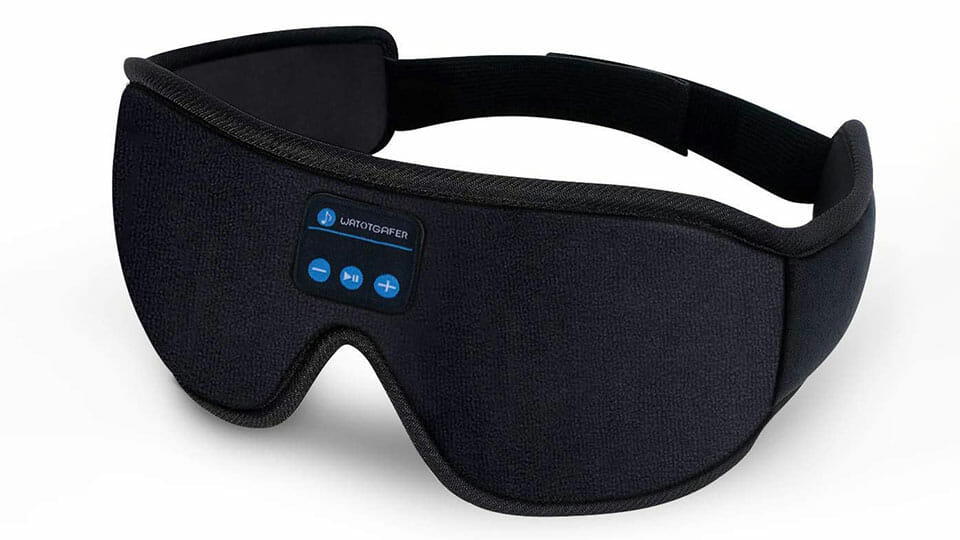
Specially designed sleep mask headphones with 3D padding for a snug fit on your face.
- Acceptable sound quality
- Good battery life
- For side sleepers, too
- Comfort could be better
These sleep masks aren’t going to impress anybody with their sound. If you only want to play some white noise, listen to audiobooks and similar audio content, these should be perfectly fine.
This isn’t a typical sleeping mask that simply covers your eyes. WATOTGAFER designed their wireless version to perfectly contour a human’s face with small dips for the eyes and padding for your nose. They’re an essential piece in your travel bag.
This Bluetooth headband can also connect wirelessly, with more than 10 hours of battery life. They connect via Bluetooth 5.0.
Above your nose, you get an array of essential commands like to adjust volume, skip tracks, or call voice assistant. You can also answer phone calls with a built-in microphone.
Control panel position on the center of the eye mask ensures side sleepers don’t accidentally press it.
8. Beyerdynamic Soul BYRD
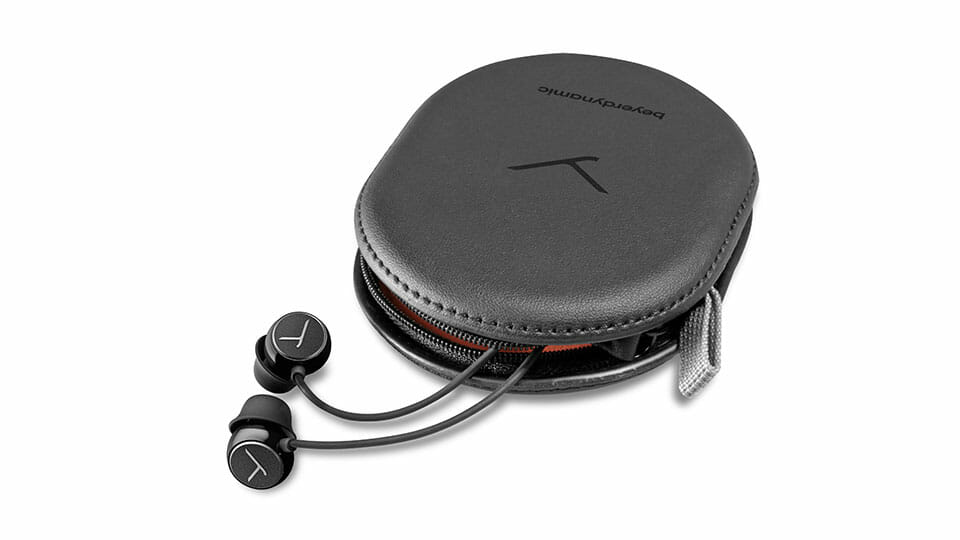
These traditional earbuds aren’t designed specifically to carry in bed, but are a great option for those who seek good sound quality in bed.
- Good sound and build quality
- Non-protruding housing
- Mediocre microphone quality
They can offer a nicely balanced audio quality with great detail and clean rendition throughout the midrange. There is also a decent presence of bass but not to the point of pleasing bassheads.
Soul BYRD are in-ear headphones that let you play whatever sleep sounds or music you want.
They have a small, non-protruding housing, that doesn’t bother you during sleep. They’re so flush you can even wear them under a motorcycle helmet.
By choosing between 5 different ear tips, you can achieve the most secure fit and maximum comfort.
BYRD’s have a 3.5mm connector and inline remote with a built-in mic for taking calls. Cables are also tangle-resistant, which is handy when you use them for sleeping.
9. Panasonic ErgoFit RP-HJE120
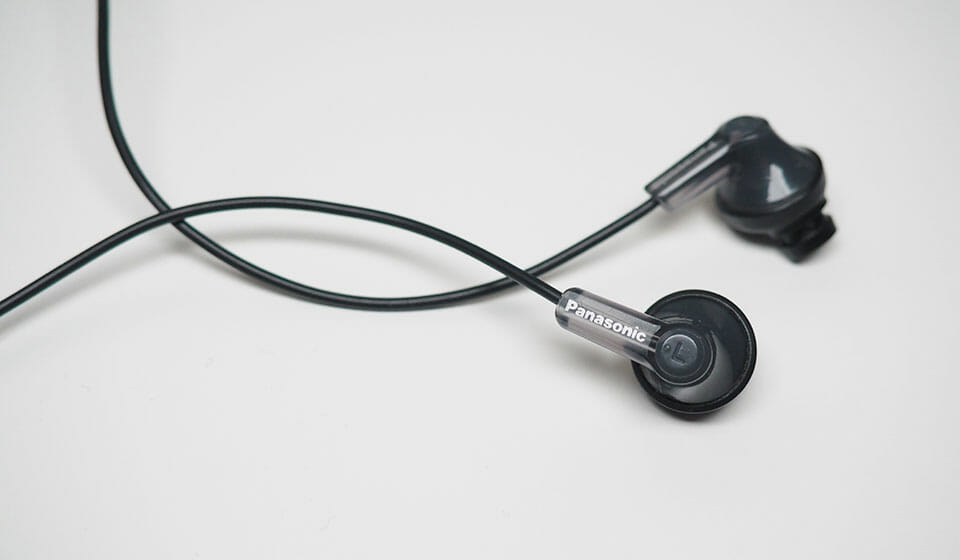
Best value silicone earbuds are one of the ultimate budget options.
- Enjoyable sound with slight bass emphasis
- Very comfortable due to ergonomic design
- Low price
- Surprisingly durable
- Cable noise
The sound quality is very enjoyable, especially in their price range.
The bass is slightly more present than the rest of the spectrum, but it’s not overpowering. The midrange and the highs remain nicely clean.
The most important thing about these is their durability. Due to their ergonomic design, they’re also a very comfortable pair, even if you are one of the side sleepers.
Of course, the best thing about ErgoFit RP-HJE120 is their headphones price. They’re dirt-cheap and easily replaceable if something breaks. And since you will be using them in bed, there’s a good chance of that happening.
In-ear headphone type ais usually pretty at noise blocking, and these Panasonic’s are no different. There’s some cable noise, though.
10. ZQUIET QuietOn 3
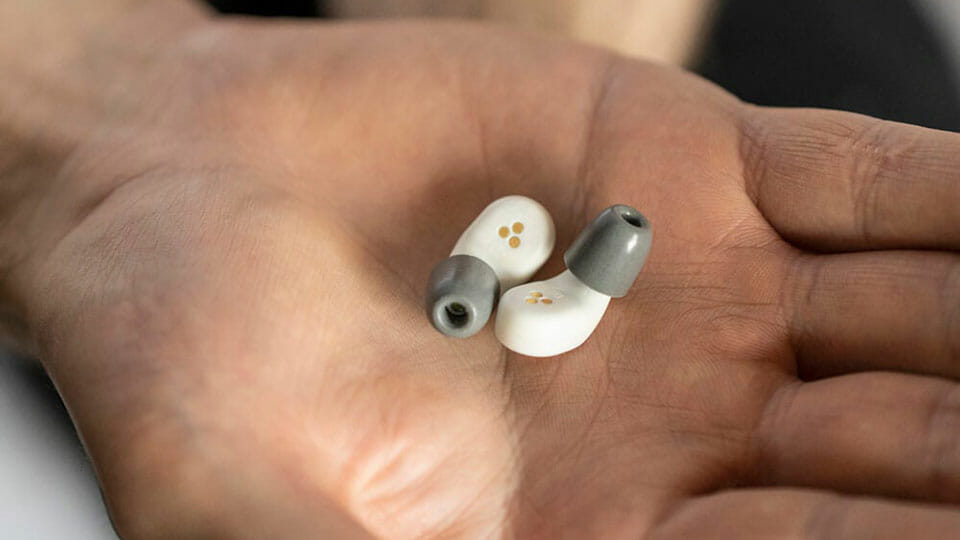
These tiny sleep headphones for sleeping don’t require wireless Bluetooth to work, yet they still offer active noise cancellation.
- Effective active noise cancellation
- ANC lets you hear the alarm clock
- Tiny & comfortable
- Long battery life
- Expensive
- No music playback or soothing sounds
Like their predecessor, the new QuietOn 3 high-end headphones work in a similar fashion. Their main goal is to block outside noises with active noise cancellation technology.
However, they do it better than the rest, especially for light sleepers. While they thoroughly reduce low-end noises and frequency response associated with snoring, they also pass through high-pitched ones.
That’s why you don’t hear the person sleeping next to you, but you can still have a conversation with someone. Also, even when wearing earbuds they let you hear the alarm clock loud and clear.
On top of that, you get 28 hours of battery life, which is superb. Sadly, that’s all you get, no music playback or soothing sounds.
How To Pick The Best Headphones For Sleeping?
What Type Of Noise Isolation Should You Pick?
Passive Isolation
It’s better than nothing and definitely the cheapest to get. Sound isolation differs between headphones and earbuds, so you might want to pick the ones with thick leather earpads or, in IEM case, deeper fit (something like double-flanged ear tips).
It does only dampen the ambient noise to a certain extend. However, in most cases, that is all that you need. If they are no loud noises around you, or a person next to you doesn’t snore that much, relying on passive isolation should be more than enough.
Active noise cancelling
A much more sophisticated way of blocking the outside world that is keeping you awake. Rather than just lowering the volume of the noise around you, ANC fully eliminates specific frequencies.
Partner’s snoring, construction work, home appliances, all of these sounds are associated with lower frequency regions, which are quickly cancelled out by the noise-cancelling technology.
However, you have to be careful not to buy the cheapest headphones or earbuds. Cheap ANC circuitry can produce a faint hum in the background, which can be similarly distracting as the ambient noise itself.
Since you use sleep headphones in bed, and you’re a restless sleeper, it’s likely something might break eventually. Therefore, it’s recommended to get a product with a good return policy.
Also, it’s possible to ensure that the sleep headphones have a trial period with a money-back guarantee. Why keep the sleep headphones if you don’t like them?
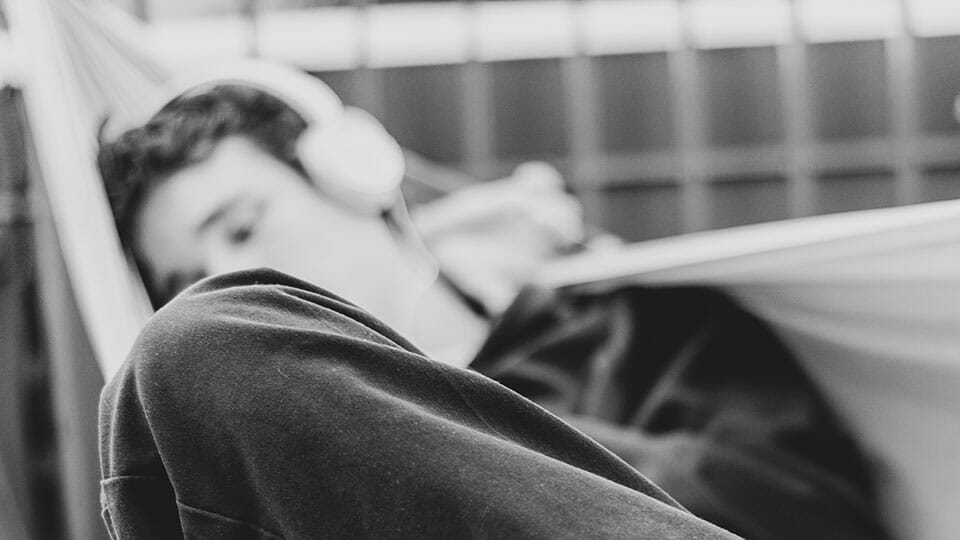
Risks Of Using Headphones For Sleeping
- Wired headphones can tangle around your neck. However, that is very unlikely. You have to be very restless and frequently turning around to make a fatal loop.
- Using in-ears during sleep can create an earwax build-up. The warm environment inside your ears is an ideal place for bacteria to grow. If you don’t properly clean your earbud headphones and ears before going to bed, you might get some unpleasant infection. Earwax buildup can even cause “otitis externa”, which is the inflammation of the ear canal.
- You don’t want your headphones to play all night long and potentially cause hearing impairment. Some more expensive sleep headphones can turn off the audio playback when you fall asleep.
In the end, some product research shows that the risk are very minimal. Therefore, it’s safe to use sleep headphones.
Frequently Asked Questions (FAQ)
Is It Okay To Wear Headphones While Sleeping?
If you use them as a substitute for earplugs or use active noise cancellation technology to cancel noise, then yes. However, you have to be aware that the more you wear them, the more earwax gets stuck in ear canals, possibly causing infections.
Also, if you prefer music playing or white noise to help you fall asleep, play it on very low volumes. You don’t want to expose your ears to all-night music blasting. That’s the fastest ticket of getting permanent hearing damage.
Are Headphones for Sleeping Safe for Kids?
Sure, if your kids have problems getting asleep due to excessive noise, sleeping headphones can benefit them. However, you have to limit the maximum volume somehow to protect them from hearing damage.
You could also try simple earplugs to see if noise reduction is sufficient to improve their sleeping quality. Or pick up a white noise machine (or simply a bedside speaker).
Is It Safe To Sleep With Bluetooth Headphones?
Radiation from wireless sleep headphones is so small that it doesn’t pose a threat to humans. Also, the radiation is nonionizing, meaning, it can’t damage your DNA like an x-ray would do. Therefore, it’s perfectly safe to sleep with Bluetooth headphones.
Can Sleeping With Headphones Cause Headaches?
Wearing over-ears can cause headaches if the clamping force is too strong. Consequently, it disrupts the blood flow. You get a similar effect as if you wear a very tight hat.
While the headache goes away once you take the headphones off, try to avoid using headphones with a too-tight fit.
Is It Bad To Sleep With Noise Cancelling Headphones?
Not at all. They offer a good alternative to earplugs and are even more effective at reducing lower frequencies.
In general, bad sleeping is far more harmful to your health.

From a childhood fascination with sound, Peter’s passion has evolved into a relentless pursuit of the finest headphones. He’s an audio expert with over 5 years of experience in testing both audiophile and consumer-grade headphones. Quote: “After many years, I can confidently tell which headphones are good and which are terrible.” Find his honest opinion in his reviews.

